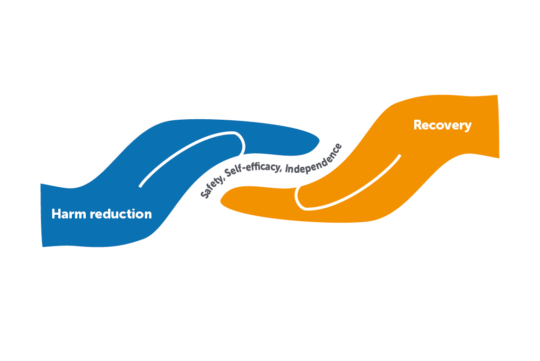Written by Mark Poingdestre, Regional Lead for the South.
Sometimes we talk about harm reduction and recovery as if they were separate things. I would like to propose that this is an outmoded way of thinking that needs properly kicking into touch. In Inclusion we think of harm reduction and recovery as sitting along a CONTINUUM of increasing safety, self-efficacy and independence.
Harm gradually reduces and people gradually need less help from services. Safety and health is the basis from which this work begins. Without it there is nothing. And in our experience, recovery often starts with people taking responsibility for reducing their own harm and genuinely engaging with a worker around this.
So reducing harm and safeguarding health are our first priority and we also have a firm duty to emphasise the progressive nature of this continuum and the need to keep pushing towards as independent an end result as possible for the client.

Why is it important that we integrate Recovery into our Harm Reduction Work from day one?
Well, there is a great inertia in addiction or dependence. If it continues over a large proportion of someone’s lifetime, their choices and options narrow down and become limited. Relationships, work, hobbies; a great many aspects of life become regulated to fit around the substance use.
The substance becomes central to the person’s lifestyle and everything else gives way to this. So left unchallenged addiction will frequently spiral downwards- even with medical and harm reduction support. This makes it essential that for all new clients an expectation is set that they will move towards their goals in order to counter this inertia before it is established as the norm.
The other reason that this is important is because there is also great inertia in many people’s relationship with services, and our relationships with them. While there are some amazing examples of work and some good evidence for our interventions, as a field we also have some unfortunate history of deficit based, paternalistic engagement that has encouraged long-term dependence on services. Where we become the client’s source of drugs supplementary to chaotic illicit use, harm might still be reduced, but problems of dependence on services are frequently exacerbated.
Challenging behaviour and encountering resistance is far harder for us than adapting to the dependent client’s primary objectives: To stay on drugs, and remain within safe, self-limited ambitions. It is also frequently in our interest not to take the risk of making prescription changes because no change is usually the safest course of action… in the short term: No-one ever gets held accountable in coroners’ court for the long-term debilitation of a client over a 20 year period due to a persistent unchallenged addictive lifestyle…
Short-Term Vs. Long Term Health
People in general become less healthy over time. This is exacerbated for substance users because harm reduction can only ever be partially successful: There is never a completely safe way to take a lot of alcohol or drugs, even when prescribed, taken as intended and not mixed with other drugs. And as we know that is not normative in our sector! So if you are using legal and illegal drugs every day you gradually become impacted as you get older, get other health conditions and your ability to heal from and resist the negative effects diminishes. So whereas Recovery temporarily increases risk, such as risk of tolerance loss overdose and hence requires a particular focus on harm reduction in the early months of recovery: It completely removes further harm from substances once sustained- permitting both health and lifestyle to “recover” in ways which are not possible while use continues.
So from this perspective we see that good quality, carefully targeted and supportive recovery interventions are essential to ensure people have a proper chance to fulfil their potential at the same time as being some of the best “harm reduction” available. At the same time, good engagement and harm reduction skills are absolutely essential in all cases but especially for those attempting early recovery!
Overall, if dependence is a situation in which the ball inevitably rolls down the hill- Sometimes quickly, and sometimes imperceptibly slowly- failing to put sufficient emphasis on pushing the other way is, quite simply a job half done. So in Inclusion we ask our staff to deliver high quality harm reduction from day one and throughout- with nudges and pulls towards self-care, empowerment, self-efficacy and recovery as an integral part of those combined interventions.